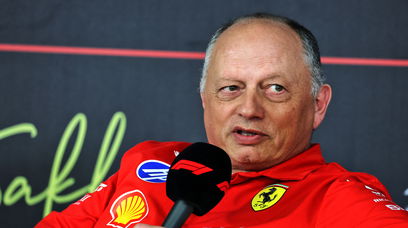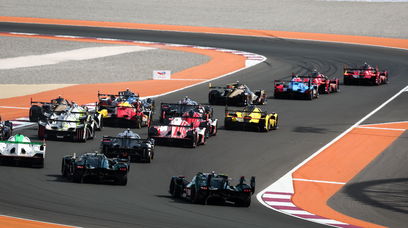The once glistening, proud Mercedes Formula 1 empire is looking a little bedraggled, bruised and dented after the second season of the ground effects era in 2023. Pride took a hammering with the deeply-flawed 2022 W13 and its zero sidepods concept, but the team still managed to win in Sao Paulo and there was general optimism that this was just a blip that can happen through a rules change and that normal service would be resumed in 2023. If by that, you meant F1's newest man to beat Max Verstappen winning 19 of 22 races and his Red Bull team 21 of them, then yes, normal service was resumed, as Mercedes went winless for the first time since 2011. Eight podiums was its smallest return since three in 2012, although one was a win for Nico Rosberg in China. The zeropods idea has been firmly banished to the rubbish bin with the more conventional design introduced in Monaco giving the team a base on which to build the 2024 W15 that it hopes will wrest the titles back to Northamptonshire from Red Bull. Reflecting on what must be done, team boss Toto Wolff tells explains how Red Bull will be caught - and how Mercedes has found itself in a "vicious circle."
"In terms of the season off-track, the sport is doing extremely well commercially," Wolff tells select media including RacingNews365. "From a Team Principal's role, the sporting side has been tough, because last year, for a long-time, we didn't understand why our car was so bad, but this year, albeit it was not so much fishing in the dark, but we couldn't capitalise in terms of race results. "I think particularly in Austin, we could have had a win, but we made mistakes, we had an off weekend in Brazil, where we can absolutely reconstruct what happened, and it is not what would happen to a top team. "We also had the quickest car in Singapore - but the results don't show it, but it was a year of let's say moving forward with the car and understanding for next year. "The stopwatch never lies, and we will see next year in Bahrain. "[We will have] a different chassis, different aerodynamics, different characteristics, different suspension and everything that we can change, we [are going to] change. "So far, the results in the virtual world are positive, but we need to be careful in terms of managing our expectations. We need such a step in order to catch up to fight for a championship, but obviously if you make a radical step, that means lots of new knowledge."
Red Bull can be caught
As was the case with Mercedes during its heyday of 2014-2021, Red Bull found itself in a position of being able to turn off the development tabs quite early in the season, safe that the 2023 titles were wrapped up long before they actually were in Japan and Qatar. When discussing Red Bull, Wolff pointed to this, and also the idea that as the ground effects rules mature, Red Bull will be left with an ever-diminishing development pool in which to swim - which is what, in part, allowed it to catch up and take the fight to the Brackley squad in 2021. "I'm sure that Red Bull has probably switched off - there is no such thing as switching off [completely], but they will have started next year's car way ahead of everybody else," Wolff says. "If we were in this situation, looking at our historic strategy, we would probably be all hands on deck by July on next year's car. "That is a month-and-a-half earlier than we did [for 2024], so when you calculate the gains that you make alone in aero, you are talking a couple of tenths. "You get out of the blocks in a good way, you are leading, you are the benchmark, you understand the car you're adding performance, like if you put an aero update on the car and it materialises like you're expecting it to, and then you are in the lead by half-a-second. "We've been there in 2019, 2020 and then you are in a cycle of positiveness where you're gaining an advantage - and this is one of the headwinds that we're having at the moment. "You have the laws of diminishing returns, you're development or performance curve flattens, that is clear. "The more mature the regulations are, the more you can extract and maybe our development curve is steeper because we are behind, but that is industrial theory, and whether you can apply it to the world of sports, I'm not quite sure. "[Red Bull's] engineering team has just done a good job, they came out of the blocks, for whatever reason, much better than everybody else - and they have a driver who is on top of his game."
"We've been there in 2019, 2020 and then you are in a cycle of positiveness where you're gaining an advantage"
Toto Wolff
The Aston Martin and McLaren question
One major alarm bell for Mercedes in 2023 was the fact that its customer engine teams Aston Martin and McLaren both out-performed it and were able to take giant steps forward while Mercedes itself remained stubbornly fixed. Aston Martin scooped eight podiums, with McLaren earning nine plus a Sprint win for Oscar Piastri in Qatar, with Hamilton and Russell only earning eight podiums between them, with Wolff keen for the team to find a wider operating window for the W15. "Aston Martin said that between the autumn car of 2022 and the start of 2023, [they found] two-and-a-half seconds," explained Wolff. "They were pretty much last, and they were the second-quickest team at the beginning of the season. McLaren expected an upgrade of two-tenths and they got a second. "The aero works completely differently, you have a ground effects car, which are aerodynamically more fragile, and on top of that, you put a tyre that you need to have exactly in the right window for it to perform. "We're talking a few degrees up and down, and if you have a car that is predictable, that is stable, a good solid platform, you're struggling less in terms of sliding and degradation - it's a vicious circle."
Most read






